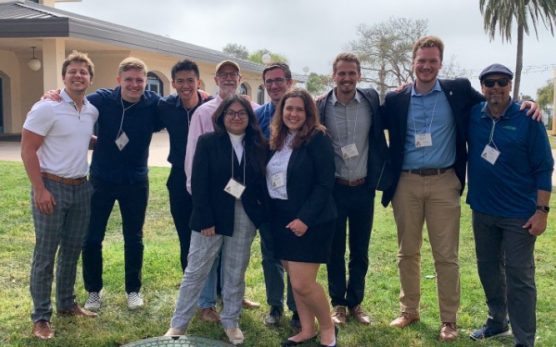Science students from The Master’s University gained valuable hands-on experience and bolstered their resumes for graduate school last month when they presented original research at the West Coast Biological Sciences Undergraduate Research conference in San Diego.
For more than 10 years, TMU’s science students have presented original research projects at the conferences, one of the largest undergraduate research conferences in the nation. These projects are collaborative efforts between students and science faculty members, giving faculty invaluable assistance in pursuing ideas and giving students practical experience with the scientific research process.
For Bryan Powell, a senior biology major and one of TMU’s student presenters last month, these kinds of experiences have been formative.
“I’ve been working on student research projects since my freshman year, and the opportunity to design and execute original experiments has been a highlight of my college experience. Being in classes and labs is one thing, but being able to participate in research projects with the faculty here was a real taste of what lab research is actually like in practice. I feel like it honed my practical skills, not just my head knowledge, which is something every student should be able to experience,” Powell said.
This year, TMU students presented four projects:
–“Use of Nanoorange as a Fluorescent Marker of Bacteria to Study Phagocytosis and Net Formation.” Student Author: Bryan Powell. Faculty Advisor: Joseph Francis.
–“Evidence to Suggest that the DNA Binding Site for the Monomeric and Heterodimeric Forms of Terminal Transferase from Calf Thymus may be Structurally Similar, but Different.” Student Authors: David Douglass, William Payne, Zoe VonDoloski, Bryan Powell and David Chui. Faculty Advisor: Ross Anderson.
–“Antimicrobial Activity of Adenostoma Fasciculatum Extracts Against Staphlococcus Epidermidis.” Student Authors: Luke Lemons and Thaí Perez. Faculty Advisor: Joseph Francis.
–“Antibiotic Properties of Adenostoma Fasciulatum s it Relates to Escherchia Coli.” Student Author: Preston Langer. Faculty Advisor: Joseph Francis.
These abstracts underwent peer review before being accepted for publication by the conference. The process is valuable preparation for students wishing to do research in the future. In addition, these published projects stand as proof to potential employers or graduate schools of students’ background with research.
“Over the years, these publications have played a vital role in helping our students with the application processes for health profession schools and graduate schools,” said Dr. Joseph Francis, dean of TMU’s School of Science, Mathematics, Technology and Health.
This year’s projects included testing a southwestern plant’s ability to kill bacteria and studying how a particular fluorescent marker can allow researchers to watch white blood cells attack bacteria. It was a rough year for bacteria in TMU’s labs.
Reflecting on how the conference went, Francis expressed gratitude for what this annual opportunity means for students:
“Students always come away excited that what they learned in the classroom and lab can be shared with others,” he said. “Education is often so ‘one-way’ in the classroom. This was a chance for our students to see that what they are learning is interesting to other students and scientists. It just makes education more fun.”
Senior biology major Zoe VonDoloski says doing research alongside professors has been “extremely rewarding.”
“I have learned so much about the practical aspects of science and how it is applied to the benefit of others,” she said. “It has also allowed me to get to know my professors better, and it was certainly bonding for me and my peers.”
Learn more about TMU’s Department of Biological and Physical Sciences here.
Like this:
Like Loading...
Related





 Tweet This
Tweet This Facebook
Facebook Digg This
Digg This Bookmark
Bookmark Stumble
Stumble RSS
RSS































REAL NAMES ONLY: All posters must use their real individual or business name. This applies equally to Twitter account holders who use a nickname.
0 Comments
You can be the first one to leave a comment.